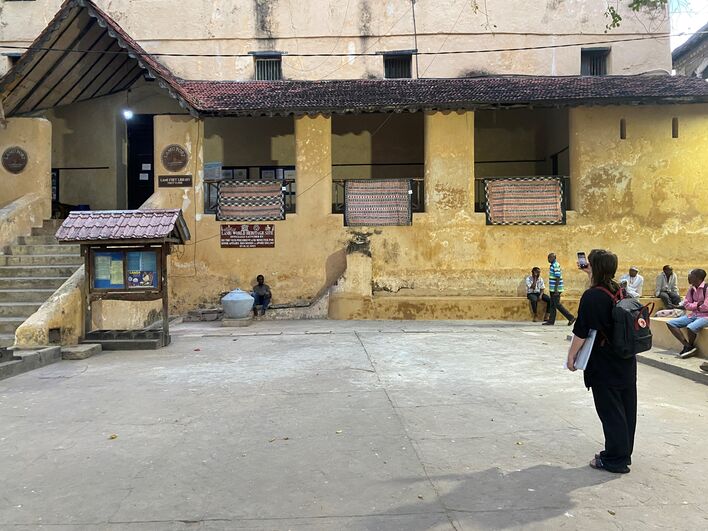In the rhythmic movement of skilled hands, an ancient craft unfolds. One that bridges past and present, revealing stories through woven patterns while concealing deeper meanings within their intricate designs. The decorated and calligraphed mats of Lamu are locally known as mikeka. Primarily crafted by women, they are deeply embedded within the Swahili cultural landscape.

A collection of mats from the late 19th century originating from the Lamu archipelago in northern Kenya, globally unique as they bear woven written texts and poems, is today kept in the Ethnologisches Museum. These mats hold significant historical value for individuals and institutions dedicated to preserving East African cultural heritage. Moreover, they serve as tangible artifacts that illustrate the intertwined history between Germany and the northern Kenyan Swahili coast.
The project “Talking Mats: Interwoven Histories – Connecting Peoples” pursues a transregional and transdisciplinary collaboration between the Ethnologisches Museum Berlin and the National Museums of Kenya (NMK), Lamu Museums and World Heritage Site, particularly the German Post Office Museum in Lamu, with a special focus on oral history, postcolonial provenance research, museology and the co-production of knowledge and of an exhibition.
The co-produced exhibition, opening in August 2025, will narrate German-East African relations from a local matrifocal point of view that is characterised by inclusiveness, multi-lingualism, trans-culturalism, Indian Ocean aesthetics, competition and community commitment. The focus is on human relationships, gift-exchange and reciprocity, all that is embedded in these mats’ role and use during rites of passage and according to life stages. Hence, the exhibition opening, which will comprise competitions and music and dance performances, is a constitutive part of the exhibition. This vernissage will include the visitors’ participation and immersion into Swahili aesthetic experience. Central narrators of the story are the mats which will be displayed in four different buildings in Lamu, according to the story each mat is able to tell.
Project Key Info
Region: Kenya
Cooperation partners: National Museums of Kenya (NMK); Jasmin Mahazi, Social and Cultural Anthropologist and Oral History Researcher
Research: PD Dr. Paola Ivanov, Curator of the Africa Collection and Head of the project (EM); Dr. Jasmin Mahazi, Scientific Coordinator of the project and independent researcher (CoMuse); Mohamed Ali Mwenje, Curator Lamu Museums and World Heritage Site (NMK); Munira Mohamed Omar, Coordination and liaison officer (NMK); Sophia Bokop, Provenance Research and Project Management (CoMuse, EM/AKu); Myriam Perrot, Museology and Exhibition Production (CoMuse, EM/AKu); Mohamed Hassan Ali, Collection Management and Curation Lamu Museums (NMK); Haji Mohamed, Conservation and Field Work Coordination (NMK); Husna Omar, Communication (NMK); Dr. Ahmed Yassin, Chief Research Scientist (NMK); Najeeb Nassir Juma Bhalo, Filmmaker Kenia; Mat Weavers: Bahati Hassan Ruli, Habute Fumo Omar, Mwanaharusi Juma, Hadija Abdalla Fahil, Aisha Dawami, Hadija Shee, Namkuu Mkaraji, Fatma Othman Hassan, Fatma Haji Rajab; Poetry: Zuwena Msellem, Mahmoud Abdulqadir Mau, Ahmed Yassin, Hadija Abdalla Fadhil; Translation and Interpretation of Poetry: Jasmin Mahazi, Sheikh Nabahany, Clarissa Vierke, Mahmoud Abdulqadir Mau, Ahmed Pakar, Zena Mahmoud Fadhil Al-Bakri; Najeeb Ahmad Nassir Juma Bhalo, Audiovisual Documentation and Film in Lamu; Carlos da Silva Pinto, Film in Berlin; Costanza Parigi, Support Film in Berlin; Isaya Muriuki Kaimenyi, Film in Matondoni and Lamu; Rebeca Olfe, Video Editing, Digital Outreach; Najma Mohamed Lali Mahazi, Mohamed Lali Mahazi, Audio recording historical mats; Curator Digital Outreach: Cristina Navarro; Technical facilitation and IT: Justus Romanowski; Design: Sefa Pala, Nicholas Maundu, Myriam Perrot; Legal Offices: Isiah Nyaega, Tobias Schmiegel, Carola Thielecke; Administration: Nelly Silau, Berit Kintschil, Frank Dreblow.
We cordially thank all mentioned and not mentioned team members and contributors, especially the CoMuse-team, staff of Stiftung Preußischer Kutlurbesitz and Berlin museums as well as of National Museums of Kenya and the participants of the Talking Mats workshop in September 2024. Special thanks go to: mat weavers, poets and interpreters, scientists and researchers, community stakeholders, dignitaries and other supporters of the project.
Project funding: CoMuse
Project duration: 01/2024 - 12/2025